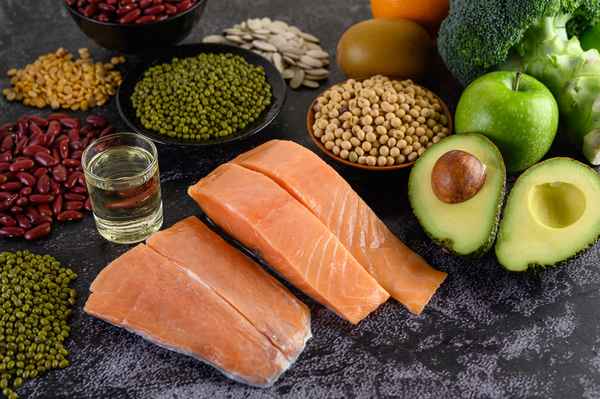Nature’s Ozempic? 3 Foods and 3 Supplements That Naturally Increase GLP-1

With the start of summer season this past Memorial Day weekend, I’ve been getting a lot of questions about weight loss - especially about the GLP-1 medications such as Ozempic and Wegovy. If you’re curious about their use, side effects, and cost and wondering if there might be natural alternatives stay tuned.
What is GLP-1?
GLP-1 also known as Glucagon-like Peptide-1, is a peptide hormone naturally produced in the gut by your body that works in several different ways to help with blood sugar control and weight loss. Some of the effects include:
- slowing down how fast your stomach empties, so you feel full longer
- sending signals to areas of the brain that regulate appetite and fullness
- increasing how much insulin your pancreas produces, which lowers blood sugar
- restricting the liver from making glucose, also contributing to blood sugar regulation
GLP-1 receptor agonist medications like Ozempic and Wegovy work by inducing these effects helping people with type 2 diabetes and weight management. Although only Wegovy and Saxenda are currently FDA-approved for weight loss when there is also a weight-related condition such as high blood pressure, high cholesterol and type 2 diabetes, other GLP-1 medications which are approved to lower blood sugar in people with type 2 diabetes are also used off-label for weight loss.
What are the Side Effects?
While effective, some people are unable to tolerate side effects of these medications. Common side effects include nausea, vomiting, and diarrhea and usually subside after a few weeks of using the medication. Serious side effects, although rare, include pancreatitis and allergic reactions. Other side effects include: constipation, gas and bloating, stomach pain, fatigue, burping, changes to your face, headache, hypoglycemia, vivid dreams, hair loss, gallbladder issues, kidney damage, stomach paralysis. Semaglutide (Ozempic, Wegovy and Rybelsus) also has a boxed warned about risk of thyroid tumors
These medications are intended to be taken long-term so it’s highly likely that some or all of the weight lost will be gained back when you stop taking it. These drugs have been on the market for less than 10 years so long-term side effects are still being studied. GLP-1 medications often cause loss of muscle mass in addition to body fat which can be an issue for aging well.
What is the Cost of These Medications?
Without insurance, these medications can be expensive and coverage for obesity care and weight-loss medications can be hit or miss. The retail price for Wegovy and Ozempic can be over $1000 per month, although some people are able to get it for less with coupons. So this can be cost prohibitive for some people.
Are There Natural Alternatives?
While they likely will not have as drastic an effect as the prescription medications, there are natural substances that can help increase GLP-1 naturally, helping with weight loss as well as a number of other health benefits. When my clients have incorporated these foods and supplements as part of a personalized lifestyle plan, they have experienced not only long-term weight loss but also reductions in other health challenges and improved vitality and longevity.

3 Types of Foods That Increase GLP-1 Naturally
Incorporating these foods into your diet can help with satiety, blood sugar regulation, and weight management.
- Healthy fats - Mono-unsaturated Fatty Acids (MUFA) that you can get from olive oil, olives, avocados, nuts and seeds, nut butters, dark chocolate and omega-3 fatty acids in cold-water fish (salmon, mackerel, anchovy, sardine, herring), nuts and seeds (flax, hemp, chia, walnuts), soybeans, and some sea vegetables are heart healthy and naturally increase GLP-1
- Lean protein - studies have shown that high protein intake stimulates release of GLP-1 contributing to greater satiety than meals high in fat or carbohydrate thus naturally reducing your appetite. Maintaining lean muscle mass is also important for basal metabolic rate and maintaining strength as we age. Studies also suggest that protein together with calcium increases release of GLP-1 even more than protein alone.
- Soluble fiber - a type of dietary fiber that absorbs water and creates a gel-like substance in your body. You get soluble fiber from a variety of healthy foods including: seeds, legumes (beans and lentils), vegetables, whole grains (oatmeal), and fruits. Many people also take this as a supplement in the form of psyllium husk or psyllium powder. Just remember to drink plenty of water so you don’t get constipated.

3 Supplements That Boost GLP-1 Levels
Small studies have shown that certain supplements such as berberine, curcumin, and ginseng can increase GLP-1 levels.
- Curcumin - one of the beneficial compounds found in turmeric has a multitude of health benefits including improving blood sugar control by stimulating GLP-1 secretion. It is also a powerful anti-inflammatory and antioxidant. I also encourage people to consume turmeric in their diet - pairing it with black pepper to increase bioavailability.
- Ginseng - a powerful adaptogenic herb, has been used traditionally for energy, focus, and immune support and also may improve blood sugar and cholesterol related to increased GLP-1 release.
- Berberine - has been touted online as being “nature’s Ozempic” and while there are many health benefits of berberine, the results for weight loss are generally not that impressive when taken alone. I often recommend berberine to my clients who have issues with blood sugar, cholesterol and an imbalance in their gut microbiome as part of a comprehensive plan to address these issues.
Bottom Line
While GLP-1 medications may be a quick and effective solution for weight loss, cost, side effects, and the potential for rebound weight gain may be an issue for some people. For those who are wanting a more natural approach with lasting results for metabolic health and longevity, a personalized lifestyle plan can be a great option.
Image by Freepik
Image by jcomp on Freepik
Image by wirestock on Freepik
Categories
- Enviroment (14)
- Healthy Heart (4)
- Food (19)
- Healthy Aging (7)
- music (1)
- soul (1)
- workout (1)
- Fitness (1)
- Award (1)
- Ayurveda (4)
- Trailblazer (1)
- yoga (1)
- Detoxification (19)
- Fasting (2)
- Herbs (2)
- Natural Supplements (6)
- Resilient Health (38)
- Stress (11)
- Adaptogens (1)
- herbal remedies (1)
- Holiday (1)
- stress management (5)
- supplements (1)
- Meditation (6)
- Sleep (3)
- Diet (18)
- Weight Loss (7)
- Detox (3)
- Resilience (5)
- impermanence (1)
- inspiration (1)
- Resilient Health Book (11)
- Chronic Fatigue (1)
- sauna (2)
- Exercise (1)
- Nature (2)
- Simplify (4)
- Recipes (13)
- Cancer (5)
- Clean Beauty (4)
- Gluten-Free (6)
- Allergies (3)
- Immune (3)
- Cold (1)
- Flu (1)
- Mental Health (3)
- Air (1)
- Women's Health (1)
- Menopause (1)

0 comments
Leave a comment
Please log in or register to post a comment